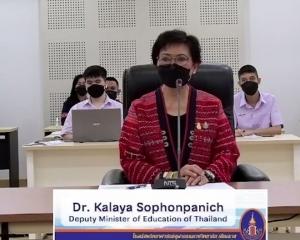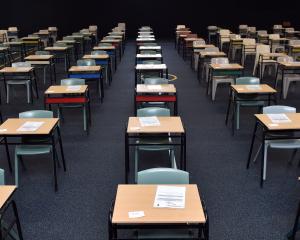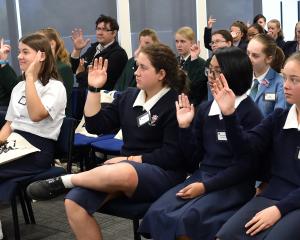Roger Kerr, of the Business Roundtable, asks: Does a bad start in life lead to failure at school? (ODT 9.10.09). His answer is that a bad start need not inevitably lead to failure at school which is, of course, correct: no individual is predestined to any level of achievement.
Nevertheless, the research literature is absolutely clear: on average in every developed country, students with good family resources outperform those who come from poorer backgrounds.
British researchers write: "One of the biggest problems facing British schools is the gap between rich and poor, and the enormous disparity in children's home backgrounds and the social and cultural capital they bring to the educational table."
A recent OECD volume summarises the research on learning and concludes: "The first and most solidly based finding is that the largest source of variation in student learning is attributable to differences in what students bring to school."
In New Zealand, Richard Harker found (in a massive piece of research funded by the Ministry of Education) that "anywhere between 70%-80% of the between schools variance [in student attainment] is due to the student `mix' which means that only between 20% and 30% is attributable to the schools themselves".
In New Zealand, each school is assigned to a decile level, derived from a 10-point scale which ranks schools on the income/educational level of the parents. (Decile 1 schools have the highest, and decile 10 schools the lowest, proportion of children from poor families.) The school's decile ranking correlates very closely the achievement of its students.
Mr Kerr's only evidence for a contrary view is an account of a successful Australian school as outlined by the principal in Towards a Moving School. The test results discussed in this book are striking but, before looking more closely, it is important to note that the movement to identify schools that beat the odds is very powerful in the United States.
Richard Rothstein, a research associate in the non-partisan Economic Policy Institute made a sustained study of all these successful schools and concluded: "A careful examination of each claim that a particular school or practice has closed the race or social class achievement gap shows that the claim is unfounded."
I am not quite so pessimistic. A book by prominent campaigner Karin Chenoweth discusses 15 US schools which enrol children of poverty and which do seem to beat the odds.
The results are impressive but careful inspection shows that these schools do not succeed just by improving leadership styles and methods of teaching and assessment (though they do this): there is also a full involvement of parents, longer school days and weeks, homework centres and health facilities in the school, free summer schools, and extra help in the classroom. Needless to say, all these are very expensive.
In New Zealand there is relatively little reliable data. Mr Kerr talks of the dramatic improvements brought about at Southern Cross campus in Auckland.
However, when Metro magazine ranked all Auckland secondary schools on value-added achievement, this school came 70th equal out of 77. The most successful school was McAuley High School, another decile 1 school (Catholic and Pasifika) which came in at 20, ahead of many high decile schools.
As well as a dedicated principal and achievement-focused teachers, the school has a health and guidance centre, a social worker, two nurses, behaviour specialists, a strong dean network, a pastoral care system, a chaplain, close liaison with the local medical and dental services, and adult education courses for all parents.
The school also capitalises on the fact that parents have a common ethnicity and a shared faith. In this school, as in the "successful" American schools, the whole community works to compensate for social disadvantage by replicating in and around the school the services which middle-class children already get in and around their homes. And this, contrary to Mr Kerr's assertion, requires more "resources".
If we now look at Bellville Primary School, Mr Kerr's sole bit of "evidence", we find that much more is going on than he lets on. There are indeed programmes of professional development and a focus on individual achievement but there is also a school council, special events for families, peer mediation, student mentoring, classes on nutrition and a high level of community participation.
Before passing final judgement we would also need to know how the students fare at high school and, later, in tertiary study and in careers. We are, after all, concerned about success in life, not just marks in tests.
Ignoring his own case study, Mr Kerr suggests that the answer to the achievement gap in New Zealand is more competition, more parental choice, and local control over teacher pay. There is no research which justifies these claims. Indeed they are simply an intensification of the policies which have operated since 1989.
Since then, achievement in our schools has plummeted: in international tests of reading, for example, New Zealand has, over these years, steadily dropped from first to sixth to 13th to 24th and the gap between the top 10% and the bottom 10% has become the largest in the developed world (the long tail of underachievers).
If New Zealand policy makers are looking to improve the achievement of children from poor homes they should not follow Mr Kerr's New Right solutions which have caused many of our problems. Rather they should look to Finland, where teaching is the most favoured profession (medicine is second), with only about one in 12 applicants selected.
Teachers are well educated: a minimum of a five-year masters degree, in which they acquire in-depth knowledge of their teaching fields and social and global awareness. (Compare this with our three-year degrees virtually denuded of subject study and, in the main, of social, let alone global, awareness).
In Finland, teachers are autonomous (no lesson plans, principal supervision or ERO-type inspections). No school results are published and schools are not ranked. All schools are well funded. Not surprisingly, Finland regularly heads OECD studies in educational achievement in all subjects and the gap between the highest and the lowest performing schools is the smallest in the world.
• Ivan Snook is Emeritus Prof of Education, Massey University, and author of many books on education, most recently The Ethical Teacher.











